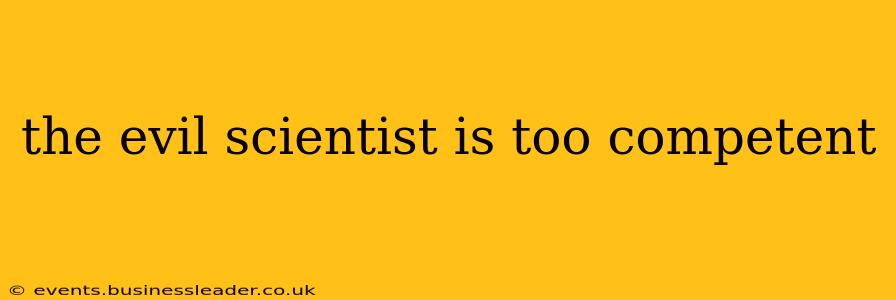The "evil scientist" is a staple of fiction, a character archetype instantly recognizable for their maniacal laughter, bubbling concoctions, and world-domination schemes. However, a fascinating sub-trope has emerged: the too competent evil scientist. This isn't the bumbling mad professor prone to self-destruction; this is a genius whose plans are meticulously crafted, their resources vast, and their intellect unparalleled. This raises intriguing questions about narrative tension, audience engagement, and the very nature of storytelling.
Why Is This Trope So Effective (and Frustrating)?
The effectiveness of the overly competent evil scientist stems from a potent combination of fear and admiration. We're captivated by their brilliance, their ability to seemingly anticipate every obstacle, and their unwavering dedication to their goals. This contrasts sharply with the usual underdog protagonists, creating a compelling power dynamic. The frustration, however, arises from the lack of immediate, easy solutions. The hero's journey becomes significantly more challenging when facing an adversary who constantly outmaneuvers them. It raises the stakes considerably and often necessitates a more intricate, satisfying resolution.
How Do Writers Overcome the "Too Competent" Problem?
The challenge lies not in eliminating the competence but in finding ways to make the villain vulnerable. This can be achieved through several narrative strategies:
1. Exploiting Blind Spots: Even the most brilliant minds have flaws.
The overly competent scientist's flaw doesn't need to be a lack of intelligence, but a blind spot in their personality. Perhaps they're overly arrogant, underestimating their opponents' resilience. Maybe they're so focused on the scientific details they neglect the human element, overlooking crucial social or emotional factors. This allows for clever maneuvering by the protagonist, exploiting weaknesses in the scientist's personality rather than their intellect.
2. Introducing Unforeseen Circumstances: No plan survives contact with reality.
Even the most meticulous plan can be derailed by unpredictable events. Introducing unforeseen circumstances, like a natural disaster, a political upheaval, or a technological malfunction, can create opportunities for the hero to gain ground. This doesn't diminish the scientist's competence but highlights the inherent limitations of even the most brilliant minds in the face of chaos.
3. The Power of Collaboration: One genius versus a team of heroes.
A single, brilliant mind, however powerful, can be overwhelmed by a collaborative team. By pitting the scientist against a group of diverse individuals, each with their own strengths and expertise, the writer can create a more balanced power struggle. The hero might not be as individually intelligent, but their combined skills and teamwork provide a compelling counterpoint to the scientist's solitary brilliance.
What Are the Common Characteristics of an "Overly Competent" Evil Scientist?
- Unwavering dedication: They are utterly committed to their goals, relentlessly pursuing their objectives with unwavering focus.
- Meticulous planning: Their schemes are highly intricate, anticipating potential obstacles and devising contingency plans.
- Superior intellect: They possess exceptional intelligence and scientific knowledge, surpassing the capabilities of their adversaries.
- Extensive resources: They often command vast resources, including advanced technology, financial backing, and a network of accomplices.
- Cold and calculating: They lack empathy and emotion, making them ruthless and efficient in their pursuit of power.
How Does the Trope Affect Narrative Tension?
The "too competent" villain creates a different kind of tension. Instead of immediate physical danger, the tension is derived from the intellectual chess match between the hero and the villain. The audience is left wondering not if the villain will succeed, but how the hero will possibly overcome such an insurmountable obstacle. This intellectual suspense can be far more gripping than simple physical threat, creating a more intellectually stimulating and ultimately rewarding narrative experience.
By carefully considering these aspects, writers can effectively utilize the "too competent" evil scientist trope, creating a compelling and engaging narrative that challenges both the characters and the audience. The key is not to eliminate the competence, but to find creative ways to introduce compelling conflicts and ensure a satisfying resolution that feels both earned and thrilling.
